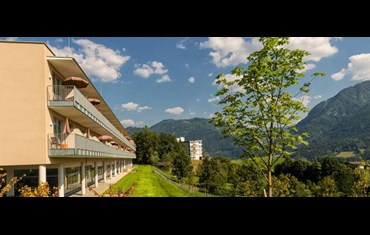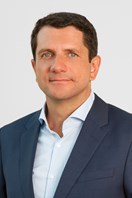Study: Holistic Rehabilitation Significantly Improves Quality of Life for Cancer Patients
2/9/2016
As a result of rehabilitation, the cases of anxiety and depression are cut in half – VAMED-Rehabilitation Center St. Veit im Pongau plans further studies
Vienna/St. Veit im Pongau – Medical advances in cancer therapy are leading to a paradigm shift in the way patients are being treated: About 70 percent of those affected have a life expectancy of more than five years after their diagnosis.
After their successful therapy many patients still need support in dealing with the physical and psychological effects of their treatments. That is why since 2011 VAMED has been offering oncological rehabilitation at two locations in Austria. Their rehabilitation effect has now been assessed in the framework of a new study.
Greater importance is now being placed on the rehabilitation of cancer patients within the healthcare system. Cancer is increasingly being considered a chronic illness and that makes a multi-professional approach in rehabilitation necessary.
Patients are being supported with specialized treatments at the highest level of medicinal and therapeutic expertise so that they will once again be able to live independently after their cancer diagnosis.
Experts at the Oncological Rehabilitation Center St. Veit in Pongau – a facility of VAMED and the Provincial Hospital Salzburg – have now assessed the long-term effect of this approach for the first time.
With astonishing results: Only three or four weeks of rehabilitation result in an “very great improvement in the quality of life”, according to Prof. Dr. Thomas Licht, Medical Director of the VAMED Rehabilitation Center.
In the framework of the study it was evidenced that the number of those cancer patients who suffered depressive moods was cut in half as a result of rehabilitation. Similar results were shown for the fear of a relapse or spreading of the cancer. Medical doctors often observed this anxiety in patients even though the actual risk of a relapse did not warrant it.
Another delayed effect of cancer is fatigue, (tiredness and exhaustion), which may result from either the cancer itself or from the treatment of the cancer and often does not occur until months after the real recovery. Patients experience this as a massive loss of their quality of life.
The same holds true for other delayed effects, such as dryness of mouth, damage to the peripheral nervous system, lack of mobility and incontinence. According to Prof. Licht, after rehabilitation, statistics show “dramatic improvements for those patients who are the most seriously affected”.
That applies mainly to women after breast cancer, who struggle with a change in their body images and planning their lives. Patients with serious eating disorders, who suffer from a dramatic weight loss, as well as people suffering from various forms of blood cancer that need to receive aggressive treatment are main target groups of oncological rehabilitation.
The basis of rehabilitation is the close cooperation of various health care professionals – ranging from specialists for internal medicine, psychologists, and physical therapists to occupational therapists. Strength and endurance training are combined with comprehensive psycho-oncological care and patient education with a view to future lifestyle habits that can aid in reducing the risk of a relapse.
Additionally, as the largest private operator of rehabilitation clinics in Austria, VAMED focuses on setting up “healing environments”. Rooms are designed to be therapeutic and activating and to reduce stress.
The materials, lights, and furnishings are specifically chosen so patients become more mobile and are not burdened with the environmental stress of a conventional hospital.
Every year the hospitals in St. Veit im Pongau and Sonnberghof in Bad Sauerbrunn in Burgenland provide oncological rehabilitation for approximately 4,000 patients.
The effect that the rehabilitation program has on patients in the long run is now being further studied. For the first study, the effects of rehabilitation, data from almost 1,000 persons is being evaluated.
On the basis of this study and jointly with Sonnberghof, Prof. Licht will continue to do research on the subject of oncological rehabilitation.
The goal is to determine how improvements in the quality of life achieved by rehabilitation last in the future.
Information about VAMED rehabilitation
As a leading healthcare services provider, VAMED operates 15 of the most prestigious rehabilitation facilities – twelve in Austria, two in Switzerland and one in the Czech Republic, with a total of 1,778 beds. VAMED, which provides 1,300 beds, is also the largest private sector supplier of rehabilitation services in Austria.
Its facilities are available for patients covered under the public health system and extend the range of health-related services to the fields of neurology, oncology, orthopedics/rheumatology, psychosomatic/psychiatry, cardiology, and pulmonology.
Technical diagnosis and treatment methods that are state-of-the art and the most up-to-date facilities ensure that the furnishings and surroundings also contribute to a patient’s speedy recovery.
As a result of company networking of sites and the involvement of additional experts for prevention, acute medicine, and care, VAMED guarantees top-notch medicinal and therapeutic treatments based on the most-recent findings at all its facilities.




